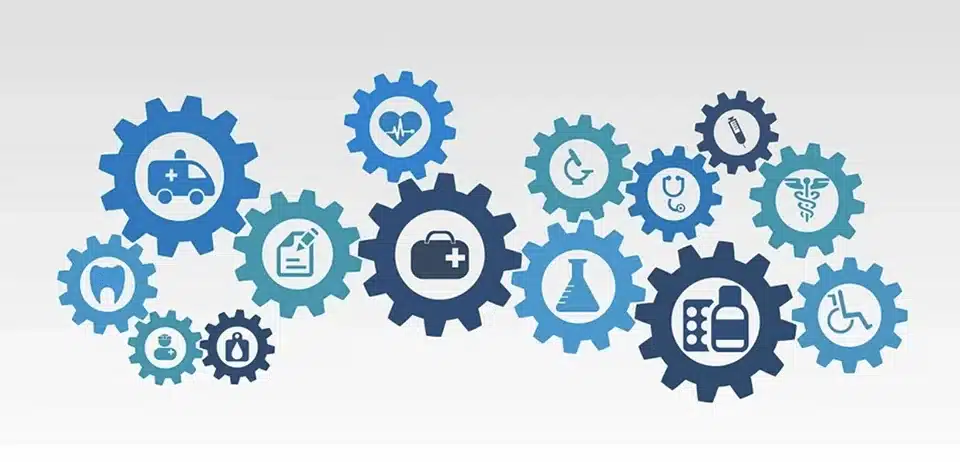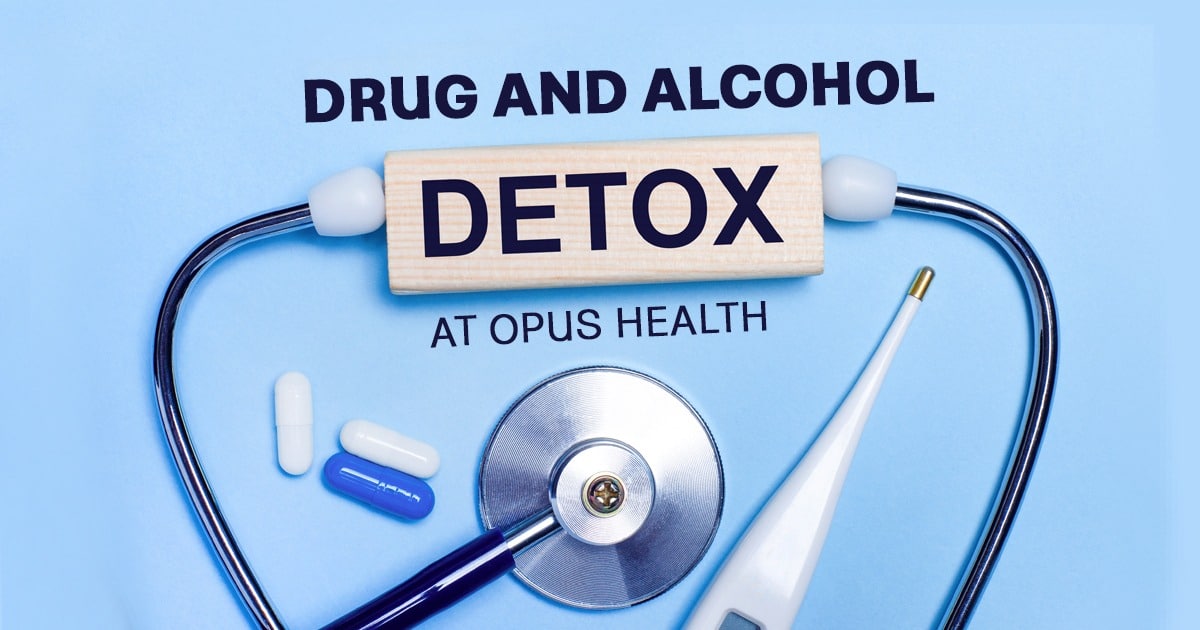What Is Detoxification?
During detoxification, you go to a facility with a team of medical, psychological, and detox facility for alcoholism. They will monitor you around the clock and support you through your withdrawal period.
This support can help reduce the most severe symptoms of withdrawal and lower the risk of relapse.
The goal of detox is to help your body remove the drugs and alcohol in a safe environment. If you detox at home or quit cold turkey, you are at a much greater risk of medical complications.
The following are the stages of alcohol detox or drug detox:
Intake and Evaluation
If you go to a professional detox center, such as what we offer at Opus, our medical team will do a full screening and evaluation.
We will do complex psychiatric evaluations and physical health exams. We will determine what type of medicines you might need and the proper dosage.
The evaluation is essential not just for your detox protocol but also because it serves as the basis for your treatment plan.
Your team will learn more about your drug and psychiatric history and your medical history.
Stabilization
During stabilization, your treatment team may prescribe medicines. These medications can help reduce symptoms and complications.
Medicines can help you be comfortable as you go through the process. You may also begin psychological therapy in addition to other options.
Addiction to drugs and alcohol is complex, as is treatment. When you struggle with addiction, there are physical symptoms as well as psychological symptoms, and both types of symptoms need treatment.
For most people, the first step of drug & alcohol addiction treatment is getting into a detox facility for alcoholism.
What is Withdrawal?
To understand drug and alcohol detox, you first have to know what withdrawal is. Withdrawal is a combination of physical and mental effects you may go through when you stop using a substance or even reduce your intake.
For example, if you are a long-time opioid user and stop taking it, you will likely have withdrawal symptoms.
We find that withdrawal is one of the most challenging parts of treatment for many of our patients. If you try to go through this on your own, it increases your risk of relapse.
Going through withdrawal without professional help can also put you at risk of severe health complications which is why you should always opt for a detox facility for alcoholism.
So why do these symptoms happen?
- When you use substances, your brain and body adjust to their presence—your brain changes in response to drug or alcohol exposure.
- If you suddenly stop exposing your brain and body to the substance, then it’s going to go into almost a type of shock.
- For example, when you take a substance and then stop, your body adjusts by changing the level of neurotransmitters. Neurotransmitters affect your brain’s reward system. Neurotransmitters trigger the release of certain chemicals.
- Withdrawal symptoms are usually the opposite of the effects of the substance.
You should talk to a medical professional before you stop taking drugs or alcohol because withdrawal symptoms can be severe.
Substances that can cause withdrawal include:
- Alcohol
- Antidepressants
- Cannabis
- Inhalants
- Stimulants
- Opioids
- Hallucinogens
General withdrawal symptoms may include:
- Shakiness
- Loss of appetite
- Upset stomach
- Sweating
- Anxiety
- Insomnia
- Depression
- Irritability
- Headaches
- Fatigue
Specific symptoms of withdrawal:
- Alcohol withdrawal syndrome: The symptoms of alcohol withdrawal from alcohol abuse can be deadly, and start as soon as hours after the last drink. Hallucinations, seizures, and delirium tremens can occur in some people.
- Benzodiazepine withdrawal: Benzodiazepines are a class of drugs used for anxiety and insomnia. Xanax is one example. Withdrawal symptoms can include seizures, anxiety and panic attacks, and confusion. The symptoms of benzodiazepine withdrawal can be life-threatening.
- Opioid withdrawal: Opioids include prescription pain medicines and heroin. Symptoms of withdrawal may include muscle aches, diarrhea, nausea and vomiting, and high blood pressure.
If someone is going through withdrawal from multiple substances simultaneously, the severity of symptoms may be more significant.
Along with the specific symptoms, relapse is a withdrawal risk. When you go through withdrawal, you may have intense cravings.
The discomfort of symptoms can also raise the likelihood that you relapse.
If you relapse following a period of not using a substance, this increases the risk of overdosing.
The length and severity of withdrawal symptoms vary. Withdrawal can last for days, weeks, or even months.
Factors affecting withdrawal include:
- The type of substance you use
- How long term your substance abuse has been going on
- The severity of your addiction
- Your method of substance use—for example, injecting, smoking, or snorting
- How much of the substance you use at a time
- Your physical health
- Whether you have underlying medical conditions

Withdrawal Medications
Medication-assisted treatment is one of the benefits of participating in an inpatient detox.
Some of the medications used during detox include:
- Benzodiazepines: Benzodiazepines have a dependence and addiction potential, but they can be helpful during detox from opioids like heroin and stimulants such as cocaine. Benzos have a sedative effect, but doctors are cautious about prescribing them during detox since they are addictive.
- Antidepressants: When you’re going through withdrawal, your brain can’t produce chemicals that create happiness. You will likely experience depression during this time, and antidepressants can help restore your brain neurotransmitters to normal levels.
- Clonidine: A medication used for alcohol and opioid withdrawal, clonidine can treat specific symptoms like anxiety, sweating, and cramps. Clonidine can also stop seizures and tremors.
- Naltrexone: Used for alcohol dependence and detox, naltrexone blocks receptors in the brain that cause it to be pleasurable; naltrexone can also reduce alcohol cravings.
- Buprenorphine: Also known as the brand name Suboxone, this medicine can help with opioid withdrawal and addiction symptoms. Buprenorphine can reduce drug cravings.
The Benefits of Detox at Opus Health
We want to emphasize that trying to quit using drugs or going through alcohol detox on your own is dangerous and possibly deadly.
Serious health complications can occur. When you go through detox in a safe, comfortable environment, you have medical staff around you at all times.
Licensed clinicians and therapists can determine the right medicines and plans for your needs.
When you participate in a detox program, you don’t have to think about anything aside from healing and recovery. Your physicians and nursing staff will keep up with your vitals and fluid levels.
There are ways to reduce discomfort. Going through detox is a critical step in your treatment, and professional guidance during this time increases the likelihood of a successful recovery.
What Are The Benefits Of Medically Monitored Detox?
The results of advanced drug addiction can be detrimental to the lives of both the user and everyone around them. In the U.S, it’s estimated that nearly 45,000 people die from drug overdoses on an average annual basis. For most people, entering rehab and going through a medically supervised detox is the number one recommended step towards beginning recovery.
However, many people going through drug addiction have reservations about receiving medical detox for a different number of reasons. Unfortunately, attempting detox in a DIY or home setting without proper medical assistance can have painful and even deadly consequences. This article will expel some myths about medical detox by highlighting the greatest benefits it can offer to an individual who is ready to recovery from drug abuse.
What is a Medically Monitored Detox?
As the name indicates, medically monitored detox refers to the process of ridding one’s body of unwanted substances through medically-supervised means. This will often include taking prescribed, safe medication under doctor supervision, in order to help manage symptoms of withdrawal. Additionally, having 24/7 access to health professionals that will assist you in going through detox is ideal.
Most experts in drug addiction recovery agree that medically monitored detox is the first crucial step towards a successful long-term recovery, most often when done as part of an accredited treatment program. This is true for mostly everyone. However, when someone is addicted to particular substances such as alcohol, benzos and/or opioids, the importance of medically supervised detox is more prominent than ever. Going through detox for these types of substances alone or without medical assistance can be especially dangerous and even fatal.

Benefits of Medically Monitored Detox
Higher Success Rate of Recovery
The percentage of patients who relapse after treatment can go up to a staggering 60% rate. These numbers can sound pretty discouraging at first glance. However, it’s important to understand the numerous factors that go into your chances of sustaining long-term recovery. When you go through detox in a comfortable, medically supervised detox center, your chances of permanently living a sober life become much higher.
According to a study conducted by a drug research facility in 2006, they found that 25% of substance users were still sober five years after receiving medical detox as part of an inpatient treatment program. On the other hand, only 6% of substance users who chose not to go through medical detox remained successful in their recovery after five years.
In a separate study in 2012, substance users who went through medical detox had a 40% to 60% higher success rate than those who abstained from medically supervised detox. The numbers are clear: if you want a higher chance of sustaining a long-term, healthy recovery, then medical detox is the way to go.
Avoids Fatal Consequences
Rehab treatment is not an easy process. It can be extremely uncomfortable, painful and even fatal if done improperly. When it comes to particular substances, such as alcohol, opioids or benzos, the risks are much higher. Research studies estimate that between 5% and 10% of those suffering from severe side effects of alcohol withdrawal will reach the point of death.
However, these studies are sure to point out that a person is much more likely to have such a severe outcome if going through their detox alone and without medical assistance. At the same time, avoiding a fatal outcome is made much easier and less likely to occur if your detox treatment is medically monitored.

Helps Reveal Hidden Health Issues
One of the most efficient details of going into a reputed treatment facility is the medical assessment you receive when you first start treatment. During this evaluation, it’s important for your doctors to help diagnose any co-occurring mental health disorders or other health problems you may suffer from.
This type of dual diagnosis is incredibly common in individuals who suffer from substance use disorders. However, it often goes unnoticed and/or untreated due to the effects of their overpowering substance abuse. When you go through medically monitored detox, your doctors will help reveal any underlying medical issues and issue you appropriate medication to treat them.
Helps Manage Withdrawal Symptoms
As has been mentioned, withdrawal can be an incredibly taxing process that can produce painful symptoms. One of the biggest benefits of going through medical detox is the opportunity to have the least painful experience possible. A medically monitored detox won’t eliminate 100% of your withdrawal symptoms, but it will provide you with the resources to have considerably less pain than if you were going through it without medical assistance.
Many people try to attempt drug and alcohol detox on their own through a DIY system, away from doctors. However, without the necessary medical support available to help them through the process, they end up going back to drug use. This can happen when people underestimate how severe withdrawal symptoms can become.
Comfortable, Research-Based Treatment
Overall, medically monitored detox is the industry standard. All of the evidence of its continued success over alternative methods is 100% research-based and founded through many studies. Any respected rehab facility will have educated professionals onboard, applying worldwide medical knowledge in order to give you the best chance possible of going through a successful recovery.
Most rehab treatment centers also strive to give you a comfortable experience. But this doesn’t only mean having nice accommodation and free-time activities. Being truly comfortable as you recover from a drug addiction means having 24/7 medical assistance available. In that way, knowing you are safe and in the best hands if anything goes wrong.

Medically Monitored Detox in Orange County
The United States has over 14,000 rehab treatment centers available nationwide. For one of the largest countries in the world, that’s an impressive feat. However, some regions are more affected than others when it comes to drug abuse statistics. In Orange County, the rate of fatal drug overdoses increased by 88% between 2000 and 2017, with 66.8% being due to opioids.
Because of this prevalent issue of drug abuse, Orange County has an ample variety of treatment options to choose from. According to one rehab directory, there are over 100+ rehab centers offering medically-assisted detox in Orange County alone.
As for treatment success rates, the same trends apply in Orange County as in the rest of the country. Medical detox rates soar in success over DIY methods. Over 50% of patients quitting their primary substance after being released from a treatment program.
Finding a Detox Program When Suffering from Drug Addiction
The success rates of those who go through detox aren’t determined solely by the amount of medical assistance offered. Often, the most crucial thing one can do for themselves is to get help as soon as possible.
If you’re suffering from substance addiction, it’s vital for you to make an informed decision to receive help immediately. For more information on finding an effective rehab treatment center that provides safe, medical detox, be sure to check a trusted online rehab directory for a list of programs near you.
Opus Health understands the importance not only of medically monitored detox, but also professional support through all stages of recovery. That’s why it’s our mission to help you no matter what phase or direction in recovery you or a loved on it currently in. Reach out to us today. No matter where or who you are, we can help you find the first step toward successful detox. Begin the path to lifelong recovery.
If you or someone you love needs a medically monitored detox in Orange County, contact us at Opus Health.




